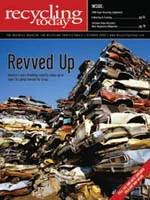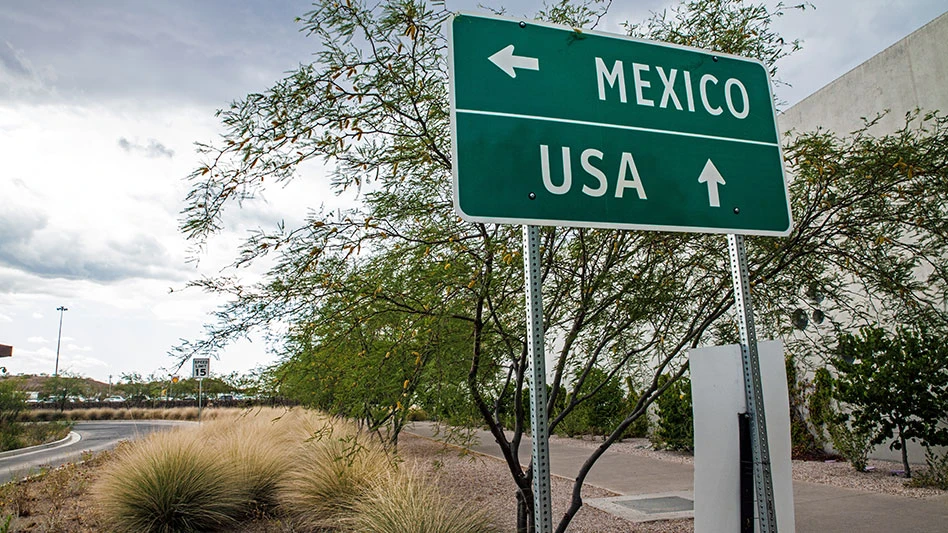Registration Tops 500 for BIR Autumn Round Table Sessions
More than 500 delegates representing 44 countries have registered for the Bureau of International Recycling’s (BIR) Autumn Round Table Sessions, which will be held Oct. 29-31 at the Hilton Hotel in Dusseldorf, Germany.
Round table sessions are scheduled that address trading trends for a number of recyclable commodities, including ferrous and nonferrous metal, stainless steel and specialty alloys, paper, plastic and tires.
In addition to the round table sessions, the event offers numerous networking opportunities as well as high-profile speakers and topical workshops.
More information, including the most up-to-date schedule and how to register, is available online at the BIR’s Web site, www.bir.org.
BIR Protests Proposed Tariff Hike on Steel Scrap
The Bureau of International Recycling (BIR), Brussels, has sent a letter to the European Commission asking that the organization take action against Russia, which is looking to raise export tariffs on steel scrap.
The BIR’s letter was in response to an article by Reuters stating that Russia was going to increase tariffs on steel scrap exports to between 120-130 Euros (U.S. $187-$202) per metric ton.
The Ministry of Economic Development and Trade of Russia, the Ministry of Industrial Trade of Russia, the Ministry of Finance of the Russian Federation, the Federal Customs Service and the Federal Antimonopoly Service have proposed the export tariff. Official sources report that the draft decree will come into effect this November.
The absence of an import duty for steel scrap and other raw materials in combination with higher export duties would help the Russian steel industry to feed its many newly installed mini-mills.
In its complaint, the BIR notes that it objects to any trade barrier that could jeopardize the free movement of raw materials across borders and insists on the importance of free access to raw materials worldwide.
BIR Marks 60th anniversary by planting 3,500 oak trees
In honor of its 60th anniversary, the Bureau of International Recycling (BIR), Brussels, has sponsored the planting of 3,500 oak trees in the Sonien forest, a 4,420-hectar forest that stretches along the southeastern part of Brussels.
According to the BIR, this gesture reflects its mission to promote the contribution the recycling industry makes towards reducing carbon dioxide emissions. A study that BIR is currently carrying out reveals that 551 million metric tons of fossil fuel emissions are saved through material recycling, which represents 1.8 percent of all fossil fuel emissions on the planet. The study was released in late September.
A Trip Through Recycling History
Although Alfred A. (Fred) Nijkerk has been involved in the scrap industry since 1956, he has journeyed back in history much further than that for his new booklet, "Recycling Through the Ages."
The 54-page booklet, which can be downloaded as a PDF from the Bureau of International Recycling’s (BIR’s) Web site at www.bir.org/pdf/Recycling
History.pdf, traces the history of recycling back to the smelting of copper in 7000 B.C. in what is now Turkey and Iran.
Chapters within the booklet describe the recycling activities of some of Earth’s great civilizations, including the Egyptians, Assyrians, Chinese, Greeks, Romans and Phoenicians.
In Europe, the era of printing and movable type helped usher in increased metals, textiles and paper recycling activity, according to Nijkerk.
The booklet also addresses the growth of scrap metal and recovered fiber recycling in more recent centuries, as the Industrial Revolution ushered in an era of far greater resource consumption and, as a result, higher levels of recycling.
Using a combination of photographs, drawings, engravings and text that incorporates humor and anecdotes, Nijkerk weaves the story of recycling into humankind’s wider history.
Nijkerk strongly makes the case for recycling as a bright spot in that wider human history. As he writes in his conclusion, "Without recycling, we would have cut down hundreds of millions more trees than we have already recklessly done. Without recycling, the Earth’s supplies of copper, lead, silver, nickel, tin and lead would now be entirely depleted."
Get curated news on YOUR industry.
Enter your email to receive our newsletters.

Explore the October 2008 Issue
Check out more from this issue and find your next story to read.
Latest from Recycling Today
- Recycled steel price crosses $500 per ton threshold
- Smithers report looks at PCR plastic’s near-term prospects
- Plastics association quantifies US-EU trade dispute impacts
- Nucor expects slimmer profits in early 2025
- CP Group announces new senior vice president
- APR publishes Design Guide in French
- AmSty recorded first sales of PolyRenew Styrene in 2024
- PRE says EU’s plastic recycling industry at a breaking point






